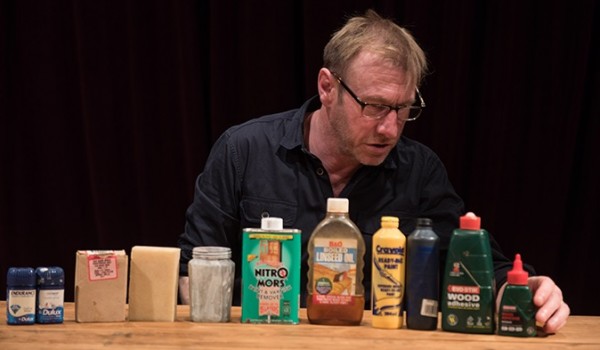Table Top Shakespeare at the Barbican Pit
reviewed for The Times, 2nd March 2016

Image Credit: Forced Entertainment
![]()
Forced Entertainment is known for vibrant, challenging work, unweaving the traditional structures of drama with installation pieces such as the six-hour confessional Speak Bitterness or the Scheherazade-inspired, hydra-headed narrative And on the Thousandth Night. Which is how I ended up in the Barbican’s Pit, watching a series of solo performers offer scene-by-scene narration of Shakespeare plays through the medium of kitchenware.
“As we witness a bottle of linseed oil rise to power or a can of beer and a bottle of sun cream fall in love, we encounter Shakespeare’s theatrical canon in a completely unexpected way,” claims the Barbican’s programme. Alternatively, we spend a long hour fidgeting with nervous confusion, trying to work out what on earth we’re expected to get out of the experience.
Each performer approaches the task differently, which makes this the type of experiment that feels more stimulating for artist than audience. The company is offering 36 playlets this week. On Tuesday, we started with Romeo and Juliet — late, which left the veteran practitioner Terry O’Connor reduced to hovering around her illuminated wooden kitchen-top like a hopeful make-up saleswoman.
When she eventually got started, the result was every bit as bland: a drained, hesitant slice of story-time. One or two of Shakespeare’s best metaphors survived the translation into plain-speech — suddenly, a moment of real impact. Yet O’Connor stripped the power of direct speech away from Juliet’s lovelorn jar of lemon marmalade and Romeo’s alcopop. This wasn’t a play of any sort, but an oddly distanced third-person narrative, far removed from the colourful props on the table.
Cathy Naden gave us a more engaging, well-told story with King John, but what’s the point of King John without the interior complexity of the Bastard Faulconbridge, so much more than a moving chequer on a battlefield? Robin Arthur’s As You Like It got the giggles rolling — if you take a punt on this, pick a comedy.
The project lacks a coherent language. Our performers efface their voices, searching for abstraction, but what’s abstract about casting a woman named Blanche as a facial cleanser or Juliet’s nurse as a bottle of disinfectant? Closer to Lego Shakespeare than Peter Brook.






